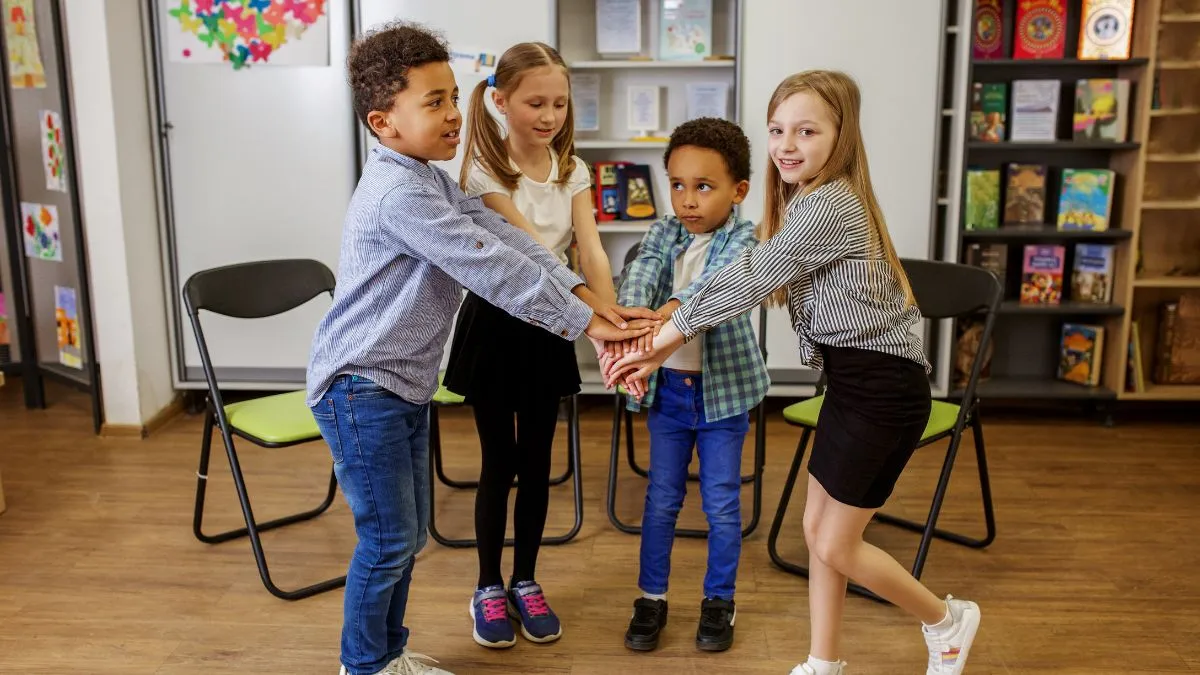- By Prerna Targhotra
- Sat, 29 Jun 2024 04:59 PM (IST)
- Source:JND
Supporting your child’s social development is crucial for their well-being and future success. Building friendships is a significant part of this development, helping children learn essential social skills, gain emotional support, and build a sense of belonging. By understanding the stages of social development and actively supporting your child’s efforts to make friends, you can help them build a strong foundation for healthy social interactions throughout their lives.
Mr. Raj Singhal, Co-founder & CEO of Footprints Childcare listed some practical tips to help your child develop and maintain healthy friendships.

Tips For Supporting Child's Social Development
1. Understand Developmental Stages
Understanding developmental stages is crucial in supporting your child’s social growth. Toddlers (18 months to 2 years) start with parallel play, playing alongside but not directly with other children. By ages 3 to 4, children engage in associative play, where shared interests like make-believe games become a basis for friendship. Children start cooperative play by ages 4 to 5, working together towards common goals, such as building a structure or organising a game. Recognizing these stages helps parents set appropriate expectations and support their child’s social interactions.
2. Encourage Social Interactions
Encouraging social interactions from an early age is essential. Arrange playdates and involve your child in group activities like sports or arts and crafts. These settings allow children to practise sharing, taking turns, and negotiating roles in a group. For younger children, facilitate these interactions by modelling social behaviour and gently guiding them through conflicts. Children can naturally develop their social skills by creating an environment where social interactions are regular and positive.
ALSO READ: Expert Sheds Light On Importance Of Play In Early Childhood Development
3. Nurture Emotional Regulation
Nurturing emotional regulation in your child is another critical aspect. Teach them to recognize and express their feelings appropriately. For example, if they feel left out, guide them to express their feelings calmly and find solutions, such as joining another group or starting a new game. This helps them cope with social challenges and builds resilience. Emotional regulation enables children to handle the ups and downs of friendships more effectively, leading to more stable and enjoyable social relationships.
4. Be Involved, But Don’t Overstep
Being involved in your child’s social life without overstepping is essential. Knowing your child’s friends and parents can provide insights into the social dynamics. It also allows you to facilitate social interactions, such as inviting friends over for playdates or planning group activities. However, balancing being involved and giving your child the space to develop their social skills independently is essential. This approach helps children feel supported while learning to navigate social situations independently.
5. Use Social Stories and Role-Playing

Child's Social Development (Image Credits: Canva)
Social stories and role-playing can help children understand social norms and practise social interactions in a safe environment. Create scenarios that your child might encounter and discuss appropriate responses. This method is particularly effective for children struggling with social cues, helping them feel more confident. Children can better understand and apply social skills in real-life settings by practising these interactions.
6. Encourage Shared Interests
Encouraging shared interests among children can facilitate the formation of friendships. Children often form friendships based on common interests. Encourage your child to explore hobbies and join clubs or teams that align with their interests. Shared activities provide a natural context for children to bond over mutual interests, whether sports, arts, or other extracurricular activities. Finding peers with similar interests can make forming friendships more enjoyable and successful for children.
7. Address Friendship Issues Promptly
Addressing friendship issues promptly and effectively is crucial. It’s normal for children to experience ups and downs in their friendships. If your child has trouble making friends or feels excluded, talk with them to understand their feelings and brainstorm solutions. Encourage them to approach new peers and suggest activities they enjoy. If necessary, seek guidance from teachers or counsellors who can offer additional support and strategies. Proactive intervention can help children navigate social challenges and develop healthier relationships.
8. Monitor Digital Interactions
Monitoring digital interactions is increasingly important as children grow older. While social media and online gaming can help maintain friendships, setting boundaries and educating your child about online safety is crucial. Encourage open communication about their online experiences and be vigilant about the risks of cyberbullying and online predators. Parents can help children use digital platforms responsibly and positively by establishing clear guidelines.
9. Lead by Example
Leading by example is one of the most powerful ways to teach children social skills. Children learn social behaviours by observing adults. Demonstrate positive social interactions in your own life, such as showing empathy, resolving conflicts calmly, and maintaining friendships. Your behaviour sets a powerful example for your child to emulate. Consistent modelling of positive social behaviour can significantly influence your child’s approach to their friendships.
10. Seek Professional Help if Needed
Finally, if your child continues to struggle with social interactions despite your efforts, consider seeking help from a professional. Therapists or social skills groups can provide targeted support to help your child develop the necessary skills to build and maintain friendships. Professional intervention can offer specialised strategies and support to address your child's specific social challenges.

